Related Research Articles

The longhorn beetles (Cerambycidae), also known as long-horned or longicorns, are a large family of beetles, with over 35,000 species described.
Congener may refer to:

Lamiinae, commonly called flat-faced longhorns, are a subfamily of the longhorn beetle family (Cerambycidae). The subfamily includes over 750 genera, rivaled in diversity within the family only by the subfamily Cerambycinae.

Macrodontia is an American genus of long-horned beetles remarkable for their large size and for the large mandibles of the males in particular.
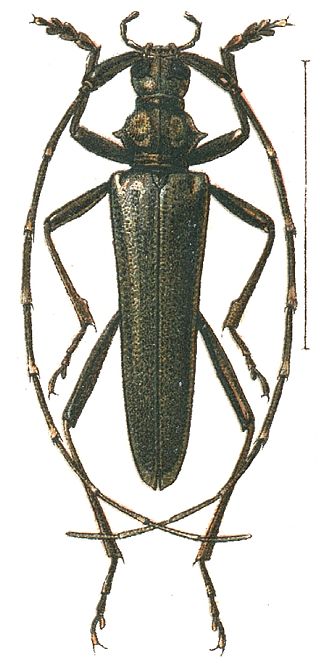
The Disteniidae are a small family of beetles in the superfamily Chrysomeloidea, traditionally treated as a group within the Cerambycidae.
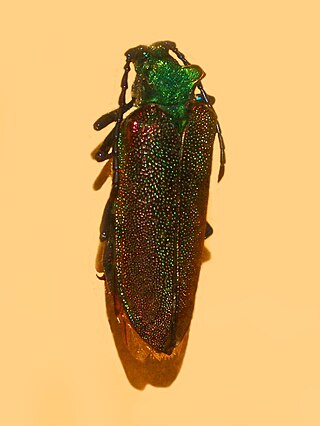
The Oxypeltidae are a small family belonging to the superfamily Chrysomeloidea, widespread in the Andean region of Chile and Argentina. They have traditionally been considered a group within the Cerambycidae.
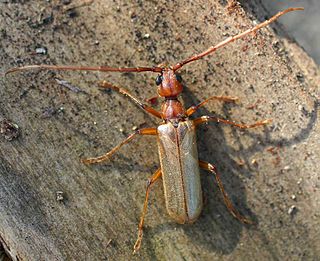
The Vesperidae are a small family of beetles, normally classified within the family Cerambycidae, of heterogeneous aspect but all characterised by larval stages related to roots of herbaceous plants or trees
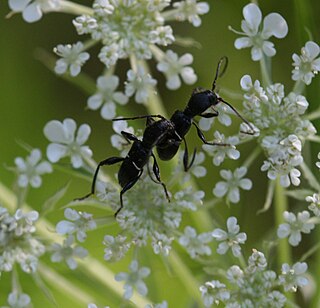
Euderces is a genus of longhorn beetles, family Cerambycidae. They are found in South, Central, and North America, with the centre of diversity in southern Mexico and Guatemala.

Knulliana is a genus of longhorn beetles. It is monotypic, being represented by the single species Knulliana cincta, commonly known as the banded hickory borer. The species may be found throughout the eastern half of North America, including Mexico and the Bahamas, with one subspecies extending to the Sonoran Desert.
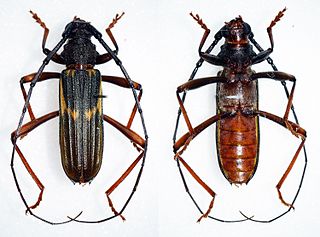
Bothriospilini is a tribe of beetles in the subfamily Cerambycinae, containing 11 genera which have a primarily neotropical distribution. The tribe was proposed in 1950 by Brazilian entomologist Frederico Lane as a member of the new subfamily Bothriospilinae, and with Bothriospila assigned as the type genus. The tribe is morphologically close to the tribe Torneutini, with which it has in common the same shape of the last abdominal segment, which is wide and largely braided in the female, as well as the anterior thigh cavities that are open from behind and the laterally open medial cavity.

Bothriospila is a genus of beetles in the family Cerambycidae, and the type genus of the tribe Bothriospilini. It contains two species: the type, Bothriospila elegans, found in Brazil and Paraguay, and Bothriospila pulcherrima, found in Brazil. The latter was described as a new species from Brazil in 2012. Bothriospila was circumscribed in 1923 by Swedish entomologist Per Olof Christopher Aurivillius.

Callidium is a genus of beetles in the family Cerambycidae, containing the following species:
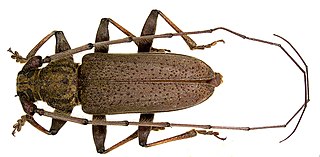
Stromatium is a genus of beetles in the family Cerambycidae, containing the following species:

Trachyderini is a tribe of long-horned beetles in the family Cerambycidae. There are at least 140 genera and 650 described species in Trachyderini.
Lepturgantes is a genus of beetles in the family Cerambycidae, containing the following species:

Aegomorphus is a large genus of beetles in the family Cerambycidae.

Syllitus is a genus of long-horned beetles in the family Cerambycidae. There are more than 40 described species in Syllitus.
Tapeina is a genus of Neotropical longhorn beetles in the subfamily Lamiinae. It is the only genus in the tribe Tapeinini.

Rhytiphora is a genus of flat-faced longhorn beetles in the Pteropliini tribe of the subfamily Lamiinae. The genus was first described in 1835 by Jean Guillaume Audinet-Serville.
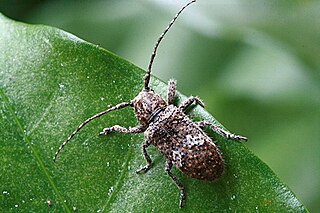
Rhytiphora bankii is a species of beetle in the family Cerambycidae. It was first described by Johan Christian Fabricius in 1775, under the genus Lamia. It is known from Australia, the Philippines, Borneo, Java, Micronesia, New Guinea, Hawaii, Moluccas, Sumatra, Vietnam, and has been introduced into Japan. The Australian species of Prosoplus were synonymised with Rhytiphora in 2013.
References
- ↑ Bezark, Larry G. A Photographic Catalog of the Cerambycidae of the World Archived 2013-08-27 at the Wayback Machine . Retrieved on 22 May 2012.